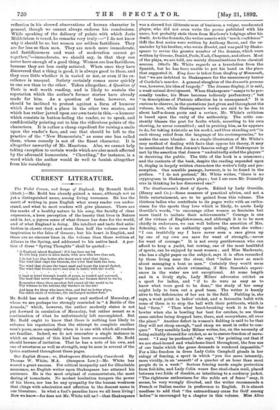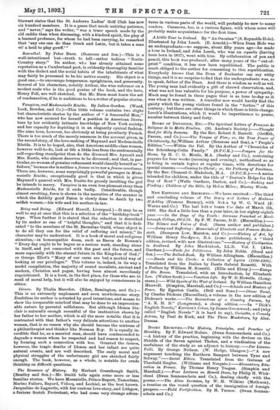The Gentlewoman's Book of Sports. Edited by Lady C1 reville.
(Henry and Co.)—Some measure of practical advice, and not a. little entertainment, are to be gained from this volume. The thirteen ladies who contribute to its pages write with an enthu- siasm for the sports they love which is likely, to quote Lady Greville's words, "to encourage other women as feminine but more timid to imitate their achievements." Courage is one of the virtues of Englishwomen, and although it is to be seen chiefly in endurance, we can well believe the assertion of Mrs. Schenley, who is an authority upon sailing, when she writes "I can truthfully say I have never seen a race given up- by one of my own sex save for want of strength,—never for want of courage." It is not every gentlewoman who can afford to keep a yacht, but rowing, one of the most healthful of sports, can be enjoyed by most women ; and Miss Mackenzie, who has a slight paper on the subject, says it is often remarked by those living near the river, that "ladies know as much about managing a boat as men." Certainly they would seem to know as much about swimming, if Mrs. Samuda's experi- ences in the water are not exceptional. At some length and in a lively style, Lady Mibcer advocates cricket as a sport for ladies, and "if to do were as easy as to know what were good to be done," the study of her essay might help to turn out a good team. The writer is keenly alive to the deficiencies of her sex in the field. Fielding is, she says, a weak point in ladies' cricket, and a favourite habit with some of them is to stop the ball with their petticoats, which is bad "form." "Then what heart-breaking work it is for the bowler when she is bowling her best for catches, to see those same catches being dropped here, there, and everywhere, all over the place." Another defect in women's fielding is said to be that they will not stoop enough, "and stoop we must in order to con- quer." Very sensibly Lady Milner writes, too, on the necessity of being suitably dressed for cricket, so as to ensure freedom of move- ment. "I may be pardoned," she says, "for pointing out that if we are steel-bound and whalebone-lined throughout, the free use of our limbs which the game demands is rendered impossible." For a like freedom in dress Lady Colin Campbell pleads in her eulogy of fencing, a sport in which "you live more intensely, more vividly, in an 'assault' of a quarter of an hour than most people do in a week." Serious fencing needs ample protection from foil-hits, and Lady Colin wears fine steel-chain mail, placed between two folds of doeskin, as interlining to a corduroy jacket. "The righteous enthusiasm for the noble art of fence" may, it seems, be very wrongly directed, and the writer recommends a. French or Italian master in preference to English. It is almost needless to add that "the extraordinary craze for Golf among ladies" is encouraged by a chapter in this volume. Miss Alice Stewart states that the St. Andrews Ladies' Golf Club has now six hundred members. It is a game that needs untiring patience, and "never," says the writer, "was a truer speech made by the old caddie than when discussing, with a kindred spirit, the play of a learned professor, for whom he had been carrying, he remarked that 'any one can do thee Greek and Latin, but it takes a man vri' a heid to play gowff.' "



































 Previous page
Previous page